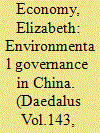| Srl | Item |
| 1 |
ID:
130498


|
|
|
|
|
| Publication |
2014.
|
| Summary/Abstract |
After three decades of rapid economic growth, environmental degradation is now one of the most significant issues facing the Chinese government. The country's air, water, and land are all heavily polluted. Despite a number of environmental protection initiatives, both at the national and local levels, China ranks poorly when compared with other emerging nations. Formal government institutions have failed to address adequately the people's concerns. Beijing's system of decentralized authoritarianism lacks the political processes and incentives needed to implement meaningful national reform and to encourage local governments and polluting factories to enforce laws and regulations. The Chinese government now faces growing pressure from civil society, as NGOs, Internet activism, and protests compel the government to proactively address environmental issues. Beijing would do well to increase engagement between the government and its citizens, rather than relying on its current crisis management style of environmental governance.
|
|
|
|
|
|
|
|
|
|
|
|
|
|
|
|
| 2 |
ID:
127646


|
|
|
|
|
| Publication |
2013.
|
| Summary/Abstract |
Through two illustrative case studies of enterprise reform in Henan Province, we examine the underlying political contentions behind the changing roles of local government in the process of the corporatization and asset restructuring of state-owned enterprises (SOE) starting in the late 1990s. As SOEs lose their ability to meet the multitude of resource demands from central and local officials, they become sites of inter-governmental conflicts that produce a no-win situation for the SOE and fiscal and social uncertainties for those communities trying to exit the socialist economy. Our first case study is Puyang municipal government, which leveraged its regulatory authority to exact heavy side-payments in return for not obstructing the corporatization of Zhongyuan Oilfield; the second case involves Zhengzhou city officials colluding with provincial bureaucrats and the state-appointed managers of the Yutong Bus Company in an insider privatization that effectively circumvented a specific Ministry of Finance prohibition.
|
|
|
|
|
|
|
|
|
|
|
|
|
|
|
|